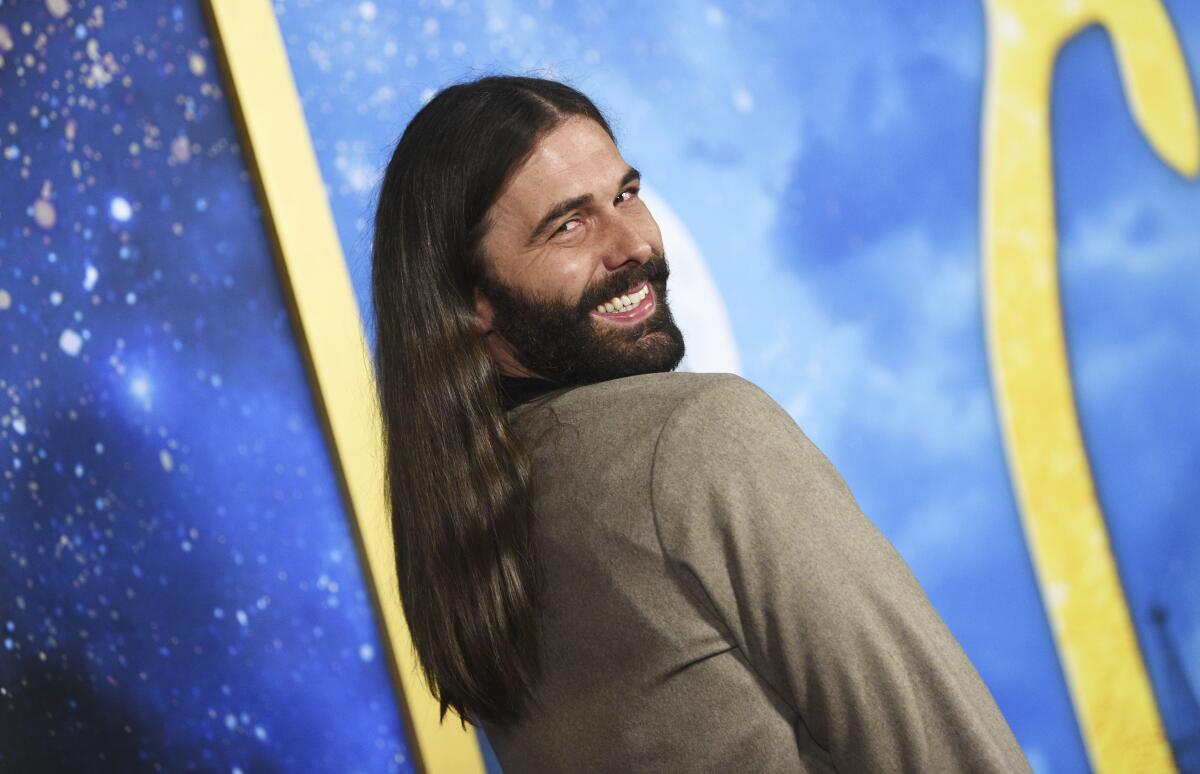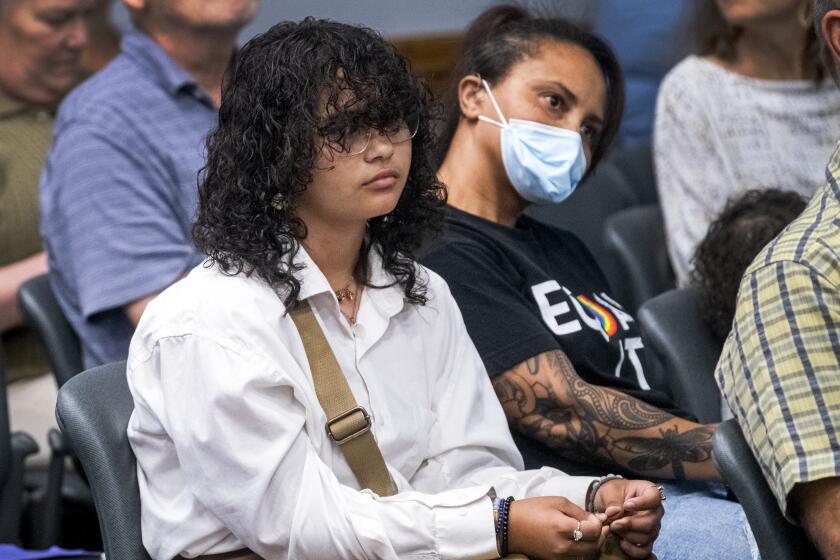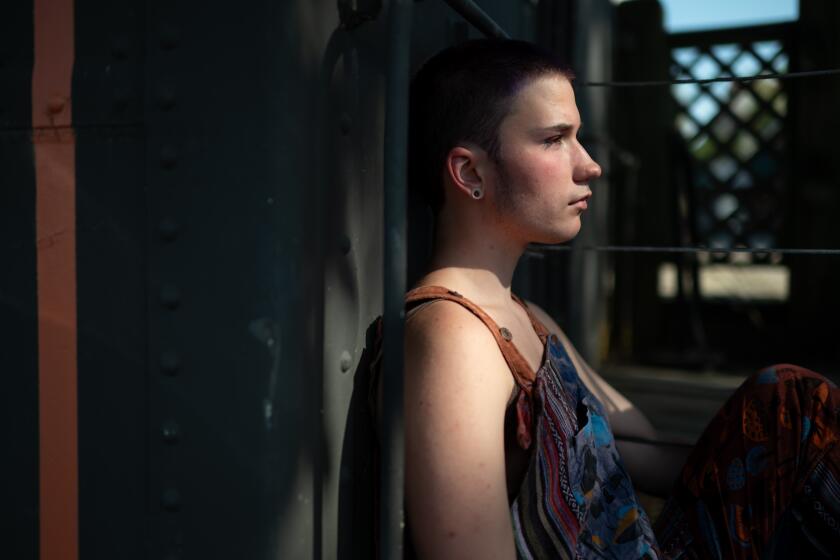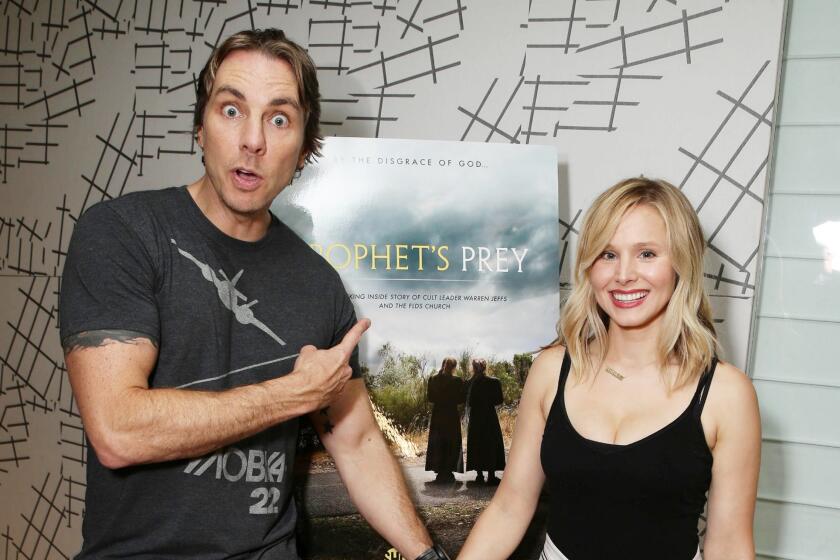Jonathan Van Ness defends trans rights in Dax Shepard debate: ‘I feel like I’m talking to my dad’

- Share via
Jonathan Van Ness defended transgender rights this week in an emotional debate with Dax Shepard, which the “Queer Eye” personality said felt like “talking to my dad.”
“I could just cry because I’m so tired of having to fight for little kids because they just want to be included,” Van Ness said while their voice cracked and they broke down in tears toward the end of a 30-minute argument on the issue, during a Monday episode of Shepard’s popular “Armchair Expert” podcast. “I have to tell you, I am very tired.”
The debate started with a tangent over whether the New York Times is a “left-leaning” news publication, with Shepard saying it “absolutely is.” Van Ness, who identified themself during the podcast as a nonbinary trans person and trans-rights activist, took exception to the publication’s progressive bona fides by pointing to its coverage of the transgender community and highlighting of “multiple anti-trans people.”
Hairdresser and “Queer Eye” star Jonathan Van Ness, known for his long, dark hair, handlebar mustache, scruffy beard and penchant for non-binary gender dressing, is adding stand-up comic to his increasingly diverse career.
In February, the NYT drew controversy for hiring columnist David French, whom LGBTQ+ rights organization GLAAD called “a writer and attorney with a deep history of anti-LGBTQ activism” in an open letter to the publication. Around the same time, more than 1,000 NYT contributors wrote a separate open letter to the paper’s editors criticizing the outlet’s reporting on transgender issues, which it said was full of “pseudoscience and euphemistic, charged language.” The letter alleged that NYT reporting on trans children “omits relevant information about its sources.”
(The NYT responded by defending its stories on transgender children, which it said included “groundbreakers in the movement, challenges and prejudice faced by the community,” and were reported “deeply and empathetically.”)
Shepard then brought up an NYT opinion piece, also published in February, that defended blockbuster author J.K. Rowling, whom trans activists have accused of being a trans exclusionary radical feminist, also known as a TERF. Rowling has denied this allegation, saying in “The Witch Trials of JK Rowling” podcast ealier this year that she is advocating against what she called a “misogynistic movement” and stands “with the women who are fighting to be heard against threats of loss of livelihood and threats to their safety.”
The “Armchair” host went on to praise the NYT opinion piece for defending people who “have any questions ... or any push back” toward trans identity, as well as others who “are very uncomfortable about teenagers transitioning.”
New policies requiring schools to notify parents if a student is gender-nonconforming are seeping into campus culture in ways some students find dangerous.
“How do we know that the person’s not going to change [their] mind?,” Shepard continued. He then mentioned the concern of someone killing themself after transitioning, another common view held by conservative leaders, which Shepard called “a good counter argument.” Such points often fail to mention the higher risk of suicide among trans children.
“This whole notion that to be critical or to question, you’re seeing the whiplash reaction to that,” Shepard added. “Because to even question it makes you an enemy — I don’t think that’s the way forward.”
After an invitation for a rebuttal, Van Ness said, “I feel like I’m talking to my dad,” before launching into their counterargument in favor of allowing trans children to participate in amateur sports, saying that the opposition was rife with misinformation. Earlier this year, Iowa banned transgender girls from participating in girls’ sports, joining more than 20 other states with similar laws.
Transgender rights advocates say new laws can do only so much if they aren’t properly implemented and funded, and designed to help the community’s most vulnerable members.
They brought up the stories of Verity Smith, a British rugby player and trans man, as well as former NCAA swimmer Lia Thomas, a trans woman. Both have become examples for lawmakers looking to ban trans athletes from participation, alleging that both had an unfair advantage in their sports. Critics point to Thomas being assigned male at birth and having gone through male puberty, giving her an unfair physical advantage. However, after transitioning, Thomas took the necessary hormone suppressants and met the testosterone levels required for NCAA competition.
Van Ness pointed to data that showed that although Thomas had won a race and ranked among the NCAA’s top female swimmers, she hadn’t broken any records during her tenure, unlike her cis-gender female counterparts.
“A lot of the rhetoric around anti-trans inclusion and just the anti-trans backlash does have a lot of misinformation and disinformation in it,” Van Ness continued. “When you look at historically the way that marginalized communities have been scapegoated in a very much a similar fashion, when have we ended up better?”
Kristen Bell and Dax Shepard were kicked out of an airport — and no, it wasn’t for letting their kids chug some non-alcoholic brewskis.
While Shepard said he wants to see female trans athletes be able to compete, he argued that such advocacy shouldn’t come at the cost of women’s rights in sports.
“We’re pretending that women aren’t the ultimate marginalized class throughout history,” he said.
Van Ness responded by saying trans athletes have been used as “a boogeyman to make us feel that our girls are being attacked” and said the economic and social disparity between women’s sports and men’s sports is a “way bigger threat to women’s sports.”
“The whole trans debate can really be boiled down to this ... we’re coming from a place of scarcity, and not from a place of abundance — there is enough for everyone,” Van Ness said.
Looking at how the changes women are continuing to spearhead in sports on the 50th anniversary of the passing of Title IX.
Later in the podcast, Van Ness said he wasn’t calling Shepard “a transphobe,” then added that a person could “not be transphobic and still have thoughts that espouse trans misogyny and espouse transphobic ideologies or beliefs.”
Shepard went on to apologize for the argument after Van Ness said they had expected to hop on the “Armchair” podcast to talk about and promote their new work, “like others” have done.
While guests on “Armchair Expert” do discuss their recent work with Shepard, the show is also known for generating headlines as many high-profile guests spill the tea, such as Prince Harry expressing his ambivalence toward the British royal family, or Jenna Ortega talking about disagreements with writers on her show “Wednesday.”
“I did not intend at all to get into a debate with you about this, I didn’t want that at all,” Shepard said. “I adore you, I think you’re hysterical and talented, and I love that you’re an activist.”
Van Ness then began to cry while sharing their experience being trans and nonbinary and said they “still struggle with my gender expression” and acknowledged that they are “scared of the vitriol that trans people face every day.”
More to Read
The biggest entertainment stories
Get our big stories about Hollywood, film, television, music, arts, culture and more right in your inbox as soon as they publish.
You may occasionally receive promotional content from the Los Angeles Times.
















